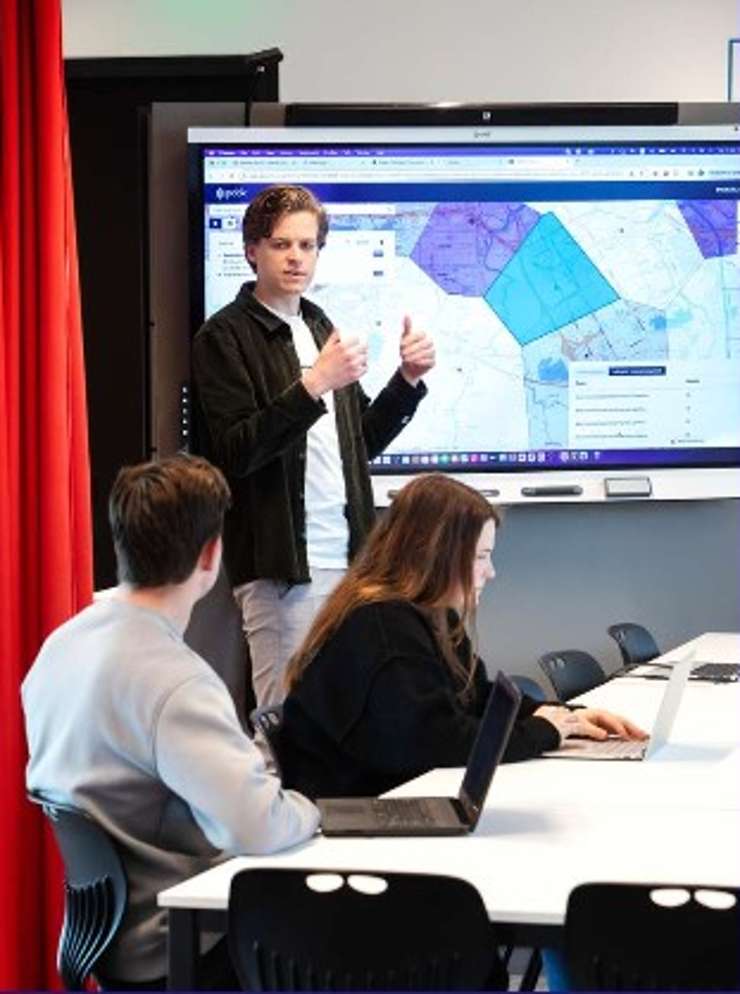News
View all news from the Amsterdam University of Applied Sciences. Looking for a particular news update? Click the magnifying glass at the top of the page to search.
AUAS Master's degree programs rated highly in the 2025 options guide
The options guide for Master’s degree programmes (Keuzegids Masters) for 2025, which was published today, rates six AUAS Master’s degree programmes particularly highly. T...

Results Circular Wood 4.0: reusing residual wood from the hospitality industry
Creating valuable applications from residual wood is more relevant than ever, as proven by Circular Wood 4.0, a research project done at the Robot Lab of the Amsterdam Un...

The role of U!REKA in an unpredictable and vulnerable European reality
The geopolitical situation in Europe has changed and future developments are difficult to predict. This situation challenges European actors to reflect on their role and...

New Master’s in Applied Quantum Technology Launching in 2025
Four Dutch universities of applied sciences – Amsterdam, Fontys, Saxion, and The Hague launch a Master’s programme in Applied Quantum Technology in September 2025. Enrolm...

How steward-ownership protects corporate mission - a teaching case
How do we prepare students for an economy that not only creates financial value, but also has social and environmental impact? The Center for Economic Transformation at t...

EPIC-WE selected for the European Youth Event 2025!
Fantastic news! The EPIC-WE project, with the participation of the Visual Methodologies Collective, has been selected for inclusion at the European Youth Event (EYE) 2025...

Kim Poldner: 'We need to take time for recovery'
Scientific Director, Kim Poldner, is an authority on regenerative entrepreneurship. Her vision of a fundamental economic transformation that not only reduces carbon emiss...

How old ideas about knowledge and religion permeate the world of blockchain
Blockchain is presented as a revolutionary technology that will eventually make traditional governments and financial institutions obsolete. Inte Gloerich, a researcher a...

Marta Malé-Alemany is Associate Professor of Digital Production
Marta Malé-Alemany has been appointed Associate professor of Digital Production at the Amsterdam University of Applied Sciences. From the Robot Lab she explores, in her o...

Kim Poldner appointed interim Scientific Director
Effective January 1, 2025, Kim Poldner has been appointed interim Scientific Director of the Center for Economic Transformation (CET). With 20 years of experience as an e...

New Master’s in Applied Quantum Technology Launching in 2025
Four Dutch universities of applied sciences – Amsterdam, Fontys, Saxion, and The Hague – received initial approval to launch a Master’s programme in Applied Quantum Techn...

BrightSky connects fundamental research to the industry
The aviation industry wants to become more sustainable, smart and efficient. The Amsterdam University of Applied Sciences (AUAS) is addressing this challenge in the Brigh...

Collaborative spirit to creating responsible business solutions
Since 2016, AMSIB has been committed to incorporating the Principles of Responsible Management (PRME) into all aspects of our organisation by integrating ethics, sustaina...

How AMSIB helped professionals to master cultural savviness
In a conversation, a Senior Director who heads Global Customer and Market Insights & Performance Analytics, shared a pressing concern in their department when working int...

Driving Sustainable Progress
We are proud to announce that AMSIB has contributed to the National SDG Report for the third year in a row by including the preliminary results of our SDG Barometer 2024...

New book by Professor Bas Kokshoorn
What can DNA traces reveal about events at a crime scene? Bas Kokshoorn and Duncan Taylor explore this question in their new book. ‘There is a high demand for knowledge o...
